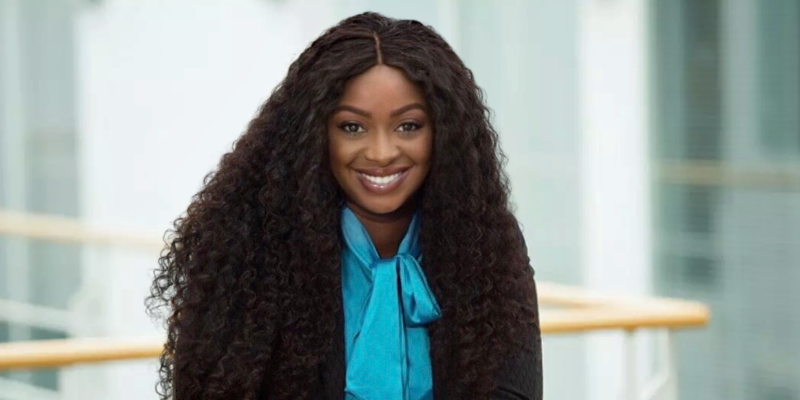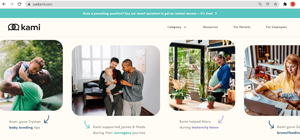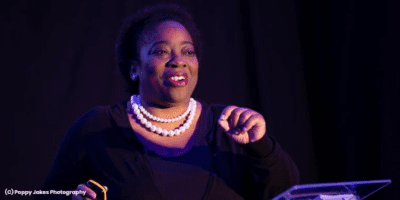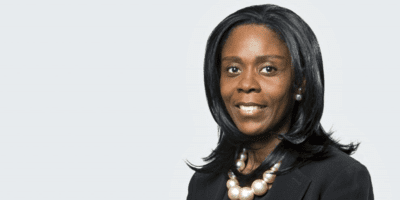Erika Brodnock is a PhD candidate and research officer at the London School of Economics (LSE) and the co-founder of Kami, an intelligent support assistant that offers guidance to working parents and employers on all matters. As a mother of five, she is a leading industry voice in parental wellness and is resident parenting expert for Sky News. Erika holds an MBA, is a visiting research fellow at King’s College London, and has won multiple awards for her dedication and work in child psychology and digital education.

“When I walk into a room, people expect me to be under-qualified to run my start-up! When I say that we have our first patent filed, and we’re going for a second, they wonder who’s in charge of that element, because it couldn’t possibly be me.”
Becoming a better founder
My educational background is non-traditional. I didn’t go to university at 18 like many would. Instead, I started a career in local authorities and government agencies, working in the public sector for around 15 years. This culminated in a career that offered parenting support services within local authorities and the enhancement of parent behaviour, which led to better-behaved children.
I used to run training courses that were accredited by Triple P (positive parenting program), Strengthening Families and FAST (Families and Schools Together). They centred around helping parents to get the best for themselves and for their children.
I then went on to start my own business: Karisma Kidz, a platform designed to help children between the ages of three to eight years old in developing emotional intelligence skills. This was started at my kitchen table in 2012. We were backed by Wayra, Telefónica’s start-up accelerator, and the Cabinet Office via UnLtd.
We were able to grow exponentially, and ultimately create a game that was pre-loaded to just under 15 million devices. We also won 16 awards. It was an absolute whirlwind of a journey, growing that company, but I couldn’t raise venture capital. Back in 2015, that was the norm. There were just a handful of Black female founders in the ecosystem and raising money was incredibly difficult for us all. Though, at the time, I started to look at the areas in which I was deficient as a founder.
I decided to do an Executive Master of Business Administration (EMBA) at the University of Surrey. As I didn’t have an undergraduate degree, I used the experience I got from running Karisma Kidz as the basis for my application. I was selected for that and won a scholarship as well. I completed my EMBA in 2019.
During my EMBA I decided that I wanted to found another company and start something new and for my dissertation, I wrote the business plan for what is now known as Kami. I graduated in the top 2% of my class.
Once my EMBA was complete, I joined a start-up incubator and started to speak with investors. When it came to accessing finance, things were changing at a glacial pace. However, by late 2018, early 2019, some key research reports around female entrepreneurship emerged and we started to see huge swathes of money being invested in women. However, I realised that all the women receiving the investment fit a particular mould, and so I wanted to understand how someone like me could also attract investment.
Raising money as a woman of colour
Women didn’t really raise money very often. And Black people certainly didn’t raise money very often, but it was all very anecdotal, nobody knew the actual quantitative figures around this.
I began to realise that I present a triple threat in the wrong direction — I didn’t go to Oxbridge for my undergraduate degree, I’m a working-class woman, and I am Black. The intersection of those three things was creating the perfect storm for investors to pass on an opportunity presented by me, no matter how strong it is.
So, I decided to apply for a PhD that centred around looking at the way venture capital is allocated as I was no longer convinced the problem was with me as opposed to the industry and the way funding was being devolved.
I was accepted into the London School of Economics on a fully-funded studentship. My supervisor is Dr Grace Lordan, who also runs The Inclusion Initiative, so, by default, I work there as well. It’s a fantastic place to work and to study.
I was able to write Diversity Beyond Gender as my first piece and contribution to my PhD study. The piece examined the allocation of venture capital in the UK over the last ten years and has been well received because it was the first piece of research that looked quantitatively at how much money was being allocated to Black and Multi-Ethnic founders in the UK. The figures were quite shocking.
That said, following the raising of awareness of the issues being faced by diverse founders, it feels as though we are beginning to see some positive change in the venture capital industry.
When we conducted the Diversity Beyond Gender research, we found that just one Black woman had raised more than a million pounds in the previous ten years that venture capital had been distributed. Yet, according to Tom Adeyoola, my co-founder at Extend Ventures, in the last 12 months, ten Black women have raised more than a million pounds in venture capital. Moving from one in 10 years to ten in one year is phenomenal progress for the industry as a whole, and not least for those Black women who have been able to access productive entrepreneurship.
I certainly believe that some of that can be attributed to the fact that the data in the report that we produced pointed out some of the huge disparities that sit within the market.
The birth of my second business: Kami
Kami is an intelligent companion for parents. Therefore, my work has always centred around parents and children, besides my PhD.
After my MBA, I was accepted on a year-long research fellowship at King’s College London, where I was part of the Centre for Urban Science and Progress (CUSP).
I was able to work alongside Assistant Professor Helen Yannakoudakis, a machine learning and AI specialist who holds a PhD from the University of Cambridge. We sought to combine my parenting skills with her AI skills and create a bot that helps parents without judgement. Parents’ mental health is front and centre so that they are able to develop the skills to ensure strong mental health in their children.
Two years on, Helen and I are co-founders of Kami, alongside our other co-founder Jacob, and we’ve filed for the first of seven potential patents for the software that we’ve been able to create. We are also in the process of raising our first institutional funding round.
That round is being enabled by the work that I’ve done for the PhD, looking at the way Black women can access in venture capital in a fair and equitable way.
The fundraising round for Kami is still open, so do drop me a line on Erika@kami.coach if you are interested in supporting our journey. You can also take a look at our most recent pitch deck.
Offering support to low-income families
Kami is an asset-locked social enterprise. Our commitment is that for every three packages paid for by an employer, we provide access to a low-income family, free of charge.
As a Black woman from a low-income background, I’m conscious of the fact that, when it comes to parenting, you have quite a divide between the ‘haves’ and the ‘have nots’, and maternal mental health, which is what I am keen to solve.
There are many fatalities that result from having maternal mental health issues, which is something that Black women are 17 times more likely to be affected by than their White peers because they are not sufficiently supported.
The intersectionality of being from a lower socio-economic background, and Black and female is one that I’m familiar with, and I’m committed to ensuring that in all aspects, we are able to level the playing field to begin to reduce the huge gaps in early childhood outcomes between lower-income and more affluent households.
Explaining intersectionality
Intersectionality is a term that came from the United States. It was specifically developed to look at the relationship between gender and ethnicity because there were women that were being discriminated against on the basis that they were female, but then also discriminated on the basis that they were Black. It’s the intersection of these two points of discrimination that has been colloquially referred to as ‘misogynoir’. However, more recently, the term has been broadened to include intersections of any kind of disadvantaged group.
For example, earlier on I mentioned that I don’t come from an Oxbridge education, and so, the intersection of my educational background with my gender is another disadvantaged intersection. That means that I am part of a group that has not received an elite university education, that is also Black and female, and as a result, I will be treated differently to those without similar characteristics.
The problem with the presumption of deficiency
I believe the greatest threat and challenge that Black women face in the start-up space is the perception of deficiency. When I walk into a room, people often expect me to be under-qualified to run my start-up! When I say that we have filed for our first patent, and we are preparing for a second, they wonder who’s in charge of that element of the business, because it couldn’t possibly be me.
It can sometimes feel as though I am jumping through extra hoops having to prove myself, as well as actually running and growing my company.
This doesn’t stop in the start-up industry. I recently wrote a report with Dr Grace Lordan, on behalf of MasterCard and the 30% Club. 44 professional Black women in corporate environments were interviewed to understand the headwinds and tailwinds they faced throughout their careers.
It explored the pay gap that they are experiencing, the type of treatment they are enduring through their corporate careers, and why they are exiting those corporate careers to look at entrepreneurship and other means of income generation. We concluded that it is equally bleak there: there is an overarching presumption of deficiency.
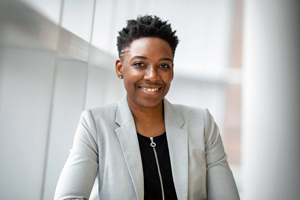
This can lead to us not being able to raise money for companies. It can also lead to us not being warmly introduced and selected for a new role. It can lead to us not having anyone in the room advocating on our behalf for promotions or high-value contracts.
I would ideally like to see things become a little fairer, but am really keen to start with people’s perceptions of Black women. If you do nothing other than making an effort to get to know a Black woman in your network on a more personal level so that you can understand her value and support her to fulfil her potential, that would be a fantastic place to start.
Tips for investors who want to be more inclusive: Send the wire, make the hire
Following the tragic murder of George Floyd, many companies are seeking to be more inclusive. The first step toward the goal of inclusivity is clear commitment. Say what you intend to do. How many investments are you actually making? How many would you like to make? How many People of Colour are you actually employing? How many would you like to employ? How many contracts are they issuing to Black start-ups? How many have you issued in the last rolling twelve months?
Once you have a clearly defined set of goals, if the numbers do not match your intentions, you can strategise and execute a plan to redress the balance. One in ten years to ten in one year became possible for the venture capital industry by identifying the problem, sending the wire, and making the hire. If it is possible to make such a marked change in 12 months there, we can create significant strides towards equity and inclusion in every industry.

One of my favourites initiatives to battle this is something that Google created last year, called the Black Founders Fund. Kami is one of the 30 companies they accepted onto the programme, from 766 applications. As the figures show, there is no shortage of Black entrepreneurs and founders out there looking for ways in which to grow and scale their companies. There are barriers that stop people from connecting to the right individuals, and then there are reasons and excuses for not making the investment, even when the company provides solid potential for high exponential growth and is founded by a strong founding team.
Creating reasons to invest rather than explanations for not investing
We can always find a reason not to do something if we look hard enough. It’s a case of examining yourself to understand if you are looking more rigorously at a company that is headed by somebody that is outside of your usual sphere or what you consider to be “normal”.
It is completely human and indeed fine to do that, as long as you’re able to admit that you are doing it, and temper your decisions based on the fact that you made the criteria slightly more difficult for this person or company. Because, if they pass despite you making it more difficult, then you’re proving that they are genuinely credible. Yet in some cases, even when the harder hoop has been jumped, people still end up not making the investments.
I have also noticed that there are a few ‘wicked’ problems we need to solve. One, we need to ensure that people are being paid equitably and fairly so that they have sufficient disposable income to become angel investors. Then, we need to ensure that the rest of the population is not discounting Black founders in the way they historically have without good reason. Research has shown we are more qualified than our peers when considering entrepreneurship, so there genuinely isn’t a reason to do so anymore.
Coming up
I am really looking forward to the release of a report from Innovate UK, where Extend Ventures (the organisation I co-founded to look into lack of access to finance) was able to contribute to analysing the way in which grants are issued in the UK. I am really excited by the fact that I get to use tools such as AI, tools that people fear are going to be completely biased, to actually uncover bias and start to develop solutions to reduce and mitigate it.
I am a girl from Streatham, who has been able to build three companies so far. I hope that shows young girls growing up in the way I did to understand that they need not be limited by gender, ethnicity, education or location. They can absolutely work towards being the very best version of themselves and achieving all they can dare to conceive. We must never allow the constraints that seem to be in place to keep us where we are when we can aspire to be more.

